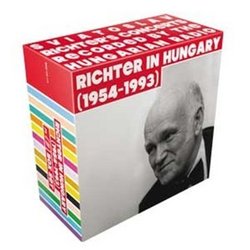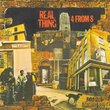| All Artists: Richter, Sviatoslav Title: Richter in Hungary Members Wishing: 0 Total Copies: 0 Label: Budapest Music Release Date: 5/11/2010 Genre: Classical Style: Number of Discs: 14 SwapaCD Credits: 14 UPC: 5998309301711 |
Search - Richter, Sviatoslav :: Richter in Hungary
CD DetailsSimilar CDs
|
CD ReviewsHappy Maestro in Hungary Malverns | Europe | 05/11/2010 (4 out of 5 stars) "Package - 2/5 stars Cds are placed in multicolored, strong cardboard box, with 7 double cd cardboard sleeves and paperpack leaflet, containing clear layout of contains of all cds. The separate cd doubles do not contain track list, only list of works - you should use leaflet to find exact tracking - not too easy and in time leaflet will wear out. Each cd pack is defined by recording period - first from 1954, ending with 1983, each doublepack with high-quality Richter photo - nice. Each cd has its own color code and that it used as decorative motive in package - design might divide opinions, it reminded me of Russian constructivists. The thick, softbound leaflet (I would have preferred stronger binding) decorated with all 14 color stripes. I do not like package of cds in cardboards, they are not easy to handle, and scratching is possible. This problem is made worse because cds have minimum markings on label side, it is not easy to say which side is right side while pulling cd out. I noted there are some small paper sticks in surface of cds - be careful with them not to enter your cd player. Leaflet and information - 4/5 stars Nice essay by Richter expert Márta Papp: Richter in Hungary, life and career, comment by Denzö Ránki,. There is a nice description of contents of each pair of cds. With essay I liked the Monsaingeon quote of Richter's personality: "...free of every kind of sentimental expression...original personality...untouched by the Soviet regime, but he was undefiled by Western civilization too. He was independent of time, era, independent of fashion - and this gave him incredible force. Force, but not in the sense of violence. " Interesting photos, high printing quality, but artistically not the best Richter photos I have seen. Texts are in English, French, German and - which is nice - Hungarian. Essays and cd information can be found in English from [...] Recordings - 2- 4/5 stars Even the earliest one was all right to my ears, not much hiss, mostly ok for the period, some tolerance needed especially in higher register. Sometimes ghost echoes occur, like Prokofiev's Visions, due to poorly conserved tape, partly spoiling the enjoyment of playing. I have not made comparision between different remasterings of same recordings (for example by Doremi). Very interestingly, I found from Doremi SR Archives no 5, that it contains Prokofiev 6th sonata, live in Budapest April 29, 1963 - not contained in this Richter in Hungary set! So this set does not contain all recorded Richter in Hungary, nor does it claim to be complete. Interpretation - 3-6 stars The cds contain mostly the usual Richter classical-romantic repertoire, with some exceptions - Szymanowski, Prokofiev and Shostakovich. Of big boxes, I feel starter had it better to buy first Praque box or DGG box, continuing trough selected Melodiya and Philips cds to this box. Because there is such an embarrassment of riches in Richter repertoire, I mention basic works (like Schumann, Bach, Beethoven) only when I felt they have some exceptional quality. I tend to think Richter did not much change his views of works - he had a strong and reasonable vision of work, usually lasting lifetime with only slight differences between recorded versions. My emphasis is on those works that are not so common in his repertoire - like Mendelssohn, or Schubert D946, or Chopin Mazurkas. CD1: All starts with the only orchestral item of the box, Schumann concerto. Richter's teacher, Neuhaus told a story how Gilels mentioned it as "the greatest piano concerto". The performance here is worthy this title: poetical and mercurial at the same time, more refreshing than later Richter's DGG recording. Brahms items reminded me of Backhaus, interesting readings which underline melancholy of music. In blind test I would not have guessed Richter as performer. Last Brahms item has a lot of feeling, bordering sentimentality. Bach items are good. Very fast tempi in F major prelude and Gigue of French Suite - so fast it is interesting! I think these WTC selections are first Richter recorded and they define the pianistic line followed by later performances. CD2: Prokofiev 8 th sonata - very much the same like DGG version, but recording is worse here. Ravel 12 track (Valse N&S:Moins vif) is an absolute gem of interpretation, in spite of bad recording. CD3: Powerful Schubert sonata and great Liszt playing, recordings ok. CD4: Average Beethoven (for Richter), some tolerance needed because of recording. Schubert D946 three pieces are rarity in repertoire (as applause after each piece suggest). It is good to have them - playing and recording is enjoyable. Central section of 2nd piece is inwardly dramatic, but not going to extreme compared to Pollini in the same piece. Richter gives these pieces a lot of time and breathing - which can be bad thing as well! I prefer Pollini's version. Wanderer-Fantasie suffers from bad recording, but it is otherwise hot stuff. CD5: Handel suite is earliest (1963) known Handel recording from Richter - first time on CD (I refer to Paul Geffen's excellent Richter discography). Crisp playing - like the rest of the cd. Interesting program to combine Handel, Shostakovich, Prokofiev - wish I had been there! Richter made later that year famous Philips recording of Shostakovich pieces, but they here are in more interesting order. I like these live recordings much - they seem to be more optimistic, playful and open compared to Paris versions. Try Fugue no 17 for example, or powerful no 15 Fugue left to end the selection. CD6: Mozart sonata is almost gouldian, with austere but beautiful slow movement. Again Beethoven sonata is just average, not any special touches until finale. Recording is all right. Chopin Scherzos are much more highlight - powerful reading and sense of occasion. CD7: Homecoming: Schumann Novelletten. This is Richter at his best: full energy and genius at the service of great composer! Haydn sonata C (Hob XVI:35) in Budapest is a new addition to CD discography - Richter's Haydn is always welcome and this is pure joy! Chopin Rondo à la Mazur is entertaining rarity, but Debussy's Puerta del Vino is a tour de force of pianistic control, excellent rhythmic handling - turning Gieseking pale in comparison. CD8: Hütterbrenner-variations are going nowhere, but fault is Schubert's, not Richter's! Schumann Fantasiestücke selection (why, why is Fabel always missing!) is a bit passive compared to DGG version. Rachmaninov selection is generous, but I prefer rarity, Prokofiev Waltz in the end of recital - entertaining, vintage Prokofiev played with fine sense of style, finely catching all the sudden changes of mood. This is a piece for repeated listening and perhaps also trying on piano by yourself - Richter's playing seems to encourage that: Master at serving Masters, preaching the memory of composers. CD9: Bach WTC2 selection is great: miracle of Bach combined with great Russian pianist. I have been slightly disappointed with his Eurodisc/RCA WTC2 and feel this version is more optimistic, like with Shostakovich selection mentioned above. You can lift eyebrow to some arpeggio or detail, but this is pure Bach, simple-sounding complexity: try c minor fugue. Food for fingers and brains alike. Only complaint is that this is not the whole book but few chosen pairs; the cd seemed to end all too early. Forget authenticity and all that - just enjoy this music and let it balance your troubled mind. CD10: Richter made Mendelssohn sound very richterian, almost comically serious, with no-nonsense-allowed attitude - I liked it! Chopin Nocturne is very much same, but comical aspects turned into chopinesque tragic tones. And to Debussy, again. It is so amazing how one artist can be so at home with so different composers music. The answer is his honesty and modesty, I guess. Chopin's Waltzes are surprisingly relaxed, entertaining readings for fun. Mazurkas suffer more and do not reveal all their secrets, but they are not at all bad either. Schubert sonata is classic stuff - same as dreams are made of. CD11: All-Beethoven. Playing does not light my fire, I feel this is playing on passive side, on defence, not attacking that Beethoven asks for. Best of four is A flat op 26. CD12: Liszt piece starting the cd is outstanding: alone worth of the price of the box. Introspective, meditative piece by worthy interpreter: marvellous. Excellent program continues without seam to Richter's always enjoyable Franck and ending with Szymanowsky. Very rewarding listening experience, but concentrating is essential. Debussy Preludes from different visit complete cd with style, particularly "West wind" is a thrilling performance. CD13: Richter's Tchaikovsky pieces are warmly natural, with the tasty hint of sweetness. I definitely prefer his readings to Pletnev's which are too dry for me. There are thunderous applause and "Bravo" shouts after Rachmaninov items. CD14: I wonder as much as you, dear reader, why giants like Gilels and Richter developed such interest towards Grieg's music in their last years. Yet, this all Grieg recital is easy to listen, warm, nice - and perhaps surprisingly it is not such a cul-de-sac in interpretational sense like playing some Beethoven sonata. All is not said and done during the long career in this piano repertoire. To sum up: this is once again a box offering treasures for all Richter fans, but can offer feeling of déjà-vu, especially in the most familiar repertoire. Overall it is 4 stars, 6 stars for some particularly inspired performances. I still wonder why there is no Bartók in Richter's recital programs in Hungary! Some comfort we got some high-quality Liszt to compensate. Playing time of cds is very generous, average over 74 mins. " Arguably the best richter box T. Avramov | Ceske Budejovice, Czech republic | 06/02/2010 (5 out of 5 stars) "To put it briefly, if you are fan of Richter or even if you want to know him, run quickly for this box set. It is arguably most comprehensive from all his box sets and very well interpreted. I would say there is no comparison to the DG set, this is by far much better. Praga set is great but not so available and these two complement well each other. The interpretation is mostly just superb, incredible and the repertoire is very wide, really showing Richter skills and vastness. Only, there are with one exception (Schumann concerto) just solo recitals, but it is the only "only", and it depends what we prefer. For me the solo recitals allow more intime contact with the musician. We have at home more then 200 CDs with Richter and this set is the crown jewel (together with some single discs - Leipzig Beethoven recital, Bach Well tempered etc.). Many thanks to Hungarians!" Beyond category jsa | San Diego, CA United States | 08/03/2010 (5 out of 5 stars) "Where to begin? First, if you are looking to acquire just one set that's representative of the art of Sviatoslav Richter, this new 14 cd collection, "Richter in Hungary" is it. If you are considering purchasing the Richter EMI Icon set which also includes 14 cds, forget about it; there is simply no comparison between the two. The recordings in the EMI set are virtually all studio sessions, including many with orchestra, whereas this set finds Richter in consistently inspired form performing live and solo (only one concerto recording is included in the box, the Schumann). The recitals span 1954 to 1993, recorded in surprisingly good sound by Hungarian Radio, that cover immense Richterian territory from Haydn to Shostakovich with an assortment of Bach, Prokofiev, Debussy, Handel, Liszt, Haydn, Mozart, Grieg, Brahms, Tchaikovsky, Chopin, Schubert, Schumann, Franck, Rachmaninoff and Szymanowski in between.
There are many performances here that deserve comment, however, by citing only a few I don't want to appear to cast doubt on the others. The fact is, I have never heard an anthology of Richter performances that matches this - the producers did a brilliant job of assembling these programs which really capture the pianist's creative imagination and keyboard authority at its best. Here, then, are a few observations: Richter was an unlikely Schubertian, yet his performances demonstrate an unusual affinity for this composer. His staggering traversal of the "Wanderer Fantasy," one of his greatest recordings for EMI, is perhaps even more impressive in the 1963 Academy of Music recital included here, by virtue of the fact that it's live and unedited. The thrill of the moment is palpable. The D958 sonata is another case in point; here Richter brings incredible virtuosity to this music, but he doesn't turn it into a showpiece. Instead, what you get is architectural structure and forward momentum that makes this one of the best readings of this late sonata I've encountered. The D664 sonata, taken from a 1978 recital, is outstanding as well - although the footprint is generally the same as the pianist's somewhat dreamy 1961 account on EMI, the playing is tighter and the conception marginally more cohesive. That Richter was a great interpretor of Debussy is reaffirmed by the second book of preludes that shimmer with a magic that is unequalled - and my basis for comparison is Richter himself. His spellbinding 1967 Spoleto Festival set, which was available on a Turnabout LP that's never been issued on cd, was some of the greatest Debussy playing I had ever heard. And this newly issued set, recorded two months after Spoleto in Budapest's Erkel Theater, is on the same exalted level. Richter, who often played only the pieces in cycles that he identified with (e.g. he didn't play the first book of Debussy's preludes in its entirety, played selections from Chopin's preludes, Schumann's Fantasiestucke etc) seemed to have an almost mystical understanding of each prelude from the second book. The only negative in the Budapest run-through is the spontaneous applause after the sixth prelude, a minor distraction that the producers should have edited out. A selection of ten preludes from the first book, taken from a 1985 recital, suffer from several interruptions from audience applause although from reading the liner notes it appears that Richter may have played them in three groups. There's also the first book of Images which has fine moments, although the opening of Reflets dans l'eau is unnaturally fussy and the pace of Hommage a Rameau is a little too funereal. Liszt's Sonetto 123 del Petrarca, an early impressionistic work, is gorgeous, rivaling Arrau's transcendant reading on Philips. There are some good Ravel readings here from a 1954 recital, the one disc that suffers from acoustic distortion: a beautiful Pavanne and powerful Jeux d'eau, though less driven than the pianist's 1960 whitewater reading from Carnegie Hall: Richter Rediscovered. The Valses Nobles et Sentimentales start out too aggressively, but calm down nicely although Rubinstein's recording from the early 60's is still the benchmark: French Recital. The Alborada del gracioso which follows, however, is a tour de force. Among other wonders is an assortment of Prokofiev's Visions fugitives, which Richter played regularly from the late 1950's through the mid '60's; some distinctive Chopin including a pair of waltzes and a beautifully rendered nocturne op 9, no. 1 from a 1972 recital as well as a somewhat uneven set of scherzi from 1965 (no. 1 is a prime example of Richter in his manic phase, traversing the slow sections at an impossibly deliberate pace and then breaking out in the exposition and finale; no. 2 is reasonably well-balanced; no. 3 is blistering; no. 4, which Richter featured in his 1960 Carnegie Hall debut, is the best of the lot). There's also an enchanting assortment of ten Tchaikovsky pieces from a 1983 recital, including selections from "The Seasons," followed by a series of Rachmaninoff etudes tableaux, concluding with an absolutely riveting op 39 no. 9 which rivals Horowitz's famous concert reading on Columbia. Mention must be made of the twelve (!) Rachmaninoff preludes from a 1969 recital, long term staples of the pianist's repertory, which showcase the unique blend of Richter the poet and virtuoso. Naturally, not everything here is the best that Richter had to offer. The clutch of non-named Beethoven sonatas from a 1976 recital, including op. 2 no. 1, op. 10 no. 3, op. 14 no. 1 and op. 26, are less consistently played, with some metronomic-type movements followed by rushing. (The op. 22 sonata, a Richter favorite, fares much better in a 1963 recital.) The first two movements of the early Mozart sonata K280 shows the pianist at his worst, with very deliberate pacing that is completely unidiomatic - something I've noticed in his Mozart concerto recordings on DG and EMI. Interestingly, the writer of the liner notes states that "on [Richter's] own admittance, Mozart remained unapproachable for him" - this was one composer he didn't have a real affinity for. It's hard to reconcile this with his brilliant executions of Haydn, but there it is. There's an eight year gap between the material taken from the last two recitals presented on these discs (1985-1993); and while it's interesting to hear 22 of Grieg's Lyric Pieces, ranging from the familiar "Norwegian March," "Bell Ringing," and "Wedding Day in Troldhaugen" to many lesser known works, by the time of the 1993 recital from which these were taken Richter was beginning to show his age. His playing had hardened to a degree and his magical touch had been replaced by a more straightforward playing of notes. This is something that's noticeable in the recitals from the 1980's as well - Richter's selection from the first book of Debussy's preludes, while very fine, are not quite what they would have been had they been recorded twenty years before. I would say that his tone was similar to that of Horowitz as he aged, which is to say that there was a gradual flattening out, a loss of color, that was a process of age and time. Still, as mentioned above, there are some real gems from the 80's - the Tchaikovsky pieces and Rachmaninoff etudes-tableaux from 1983 are wonderful stuff. The treasures here are practically inexhaustable; and, most importantly, the variety of the music is incredibly interesting - nothing is repeated anywhere over the fourteen discs. The extensive and insightful liner notes round out a premier set. For those building a Richter collection, this set makes an excellent companion to the pianist's complete DG recordings: Pianist of the Century (Box). And don't let the price put you off - I bought a set for a hundred bucks from a European-based amazon reseller that arrived in California in five days. Highest recommendation!! " |





